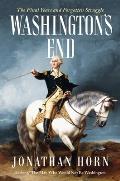The First President’s Last Years
This is the day after Presidents’ Day, so it seems appropriate to think about life after the first Presidency.
Jonathan Horn, formerly a White House speechwriter, has just published Washington’s End, about George Washington’s retirement from the White House. Here’s an interview on the website of his alma mater, Yale:
Horn also did an interview with Time magazine and published an op-ed at Politico in this auspicious window between the anniversaries of Washington’s birth.
Jonathan Horn, formerly a White House speechwriter, has just published Washington’s End, about George Washington’s retirement from the White House. Here’s an interview on the website of his alma mater, Yale:
How did Washington envision his retirement?Washington was a great one for retirements. He understood that the difference between a republican general and a military dictator, between a President and a king, lay in relinquishing power. He established the norm for almost all subsequent Presidents that was eventually written into the Constitution.
When Washington retired in March of 1797, he imagined himself returning to Mount Vernon and not straying far from the estate’s boundaries for the rest of his life. He imagined himself occupying his time as a farmer, renovating his house, and arranging his papers. History turned out differently.
How did the public react to his decision to leave public life?
Washington retired at a time when heads of state usually only relinquished power upon their deaths. His successor, John Adams, recalled looking around the room during his inauguration and seeing people in tears. He knew those tears weren’t for him, but that everyone was so moved by Washington surrendering power. They knew they were witnessing history.
Editors of opposition newspapers were delighted to see Washington return to Mount Vernon. They had attacked him throughout his second term, sometimes in quite personal terms. They celebrated his retirement in a way that I think would surprise people today.
Did Washington keep abreast of politics during his brief retirement?
He very much stayed informed. He read newspapers voraciously. Adams had retained Washington’s cabinet secretaries, and the former president pressed them to send him updates of what was happening behind the scenes.
Today, we’re accustomed to assuming presidents become less partisan when they leave office. The opposite happened in Washington’s case. He despondently concluded that people had to choose between the Federalists or Jeffersonian Republicans, and he was a Federalist. He favored the infamous Alien and Sedition acts, which were aimed at suppressing the political opposition, and favored excluding Republicans from high-ranking positions in the new army.
There were some Federalists who hoped to persuade him to run for a third term in 1800. Washington tried to silence these discussions, and, of course, he didn’t live to see the election.
Horn also did an interview with Time magazine and published an op-ed at Politico in this auspicious window between the anniversaries of Washington’s birth.


No comments:
Post a Comment